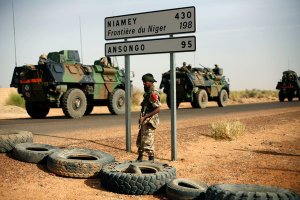 French troops mobilizing across Mali
French troops mobilizing across MaliTimbuktu, 03/21/2013 – Yesterday, it was reported that another French soldier has died in the ongoing conflict in Mali. A suicide bomber strapped a vest of explosives to himself near a French military checkpoint in Timbuktu and, upon detonation of his device, killed one French soldier. This marks the fifth death of a French soldier since their direct involvement began on January 10th of this year, and will certainly give France further motivation to end the conflict in Mali as soon as possible.
The struggle began with a military coup that dislodged the democratic leadership that had controlled the country. The military claimed that they were not being supplied with enough equipment and arms to combat the Tuareg rebels. Since Mali gained its independence in 1960, the Tuareg have staged many rebellions in an attempt to create their own country called Azawad, in northern Mali. Ironically, when the military took control of the government, they did not have the power structure to continue the governance of the country, creating a power vacuum that the Tuareg quickly took advantage of. With the Malian military occupied with the south and keeping power there, the Tuareg finally seized control of many northern cities. However, being that their fighting force was not incredibly strong, they were taken out of power by al-Qaeda linked radical Islamist groups. Once these groups had established themselves in northern Mali, they governed the area with a very strict interpretation of Sharia (Islamic law) that has caused many humanitarian inquiries. Among the new restrictions were bans on music, drinking, and smoking. They had also begun to destroy historical landmarks, calling them idolatrous due to their strict interpretation of the Qur’an, creating outrage in many cultural organizations worldwide. Since the cities then came under direct rule of radical militants, floggings, public executions, public stoning,and amputations had become commonplace. They also cut off access to utilities in many of the cities that they occupied, compounding the humanitarian disaster.
International Response
This succession of events led to the involvement of the international community and France in particular. The day after the military had declared control of the country, France sent a military force into the region that consisted of 2,150 troops. The United States supplied intelligence, air support, and monetary assistance, as the threat of a new haven for al-Qaeda is in direct conflict with their foreign policy. Many other countries combined including China, India, Senegal, and many others combined to donate hundreds of millions of dollars to the cause, with the EU contributing around 67 million euros.
 Malians in Timbuktu before the civil war
Malians in Timbuktu before the civil warThe mission to re-establish a stable government to all of Mali has been incredibly successful thus far, mainly due to the French military presence in the region. They successfully took back control of Timbuktu, Gao, and finally Kidal, all of which were massive strongholds for these radical Islamist militants, and thus sites of immense humanitarian abuses. Kidal was the last major city to be controlled by the militants, and was a huge step for the French initiative.
Potential U.N. Involvement Moving Forward

Herve Ladsous (left) with Marc Fonbaustier (right)
Now that the bulk of the conflict is over, France looks to the UN to take over with the peacekeeping force that had been suggested earlier in the conflict once it was a more stable situation. U.N. peacekeeping chief Herve Ladsous (pictured above with French diplomat Marc Fonbaustier) had said that the UN would deploy a peacekeeping force “at the appropriate time.” He continued “I think that the Security Council will be looking at a resolution in the next two or three weeks and then we will move ahead for full deployment.” The force (expected to number around 6,000 members) is expected to be in place well before the July 31st elections as the country looks to restore the democracy that had stood since 1992. Some Malians, however, are uneasy about the force, fearing that it will create a divide between the north and south like Sudan. The international community hopes that they will accept the resolution so that Mali does not fall into chaos like many other African countries have when the French soldiers inevitably leave, which may be sooner rather than later given the latest death of one of their own and the stir that it has caused.